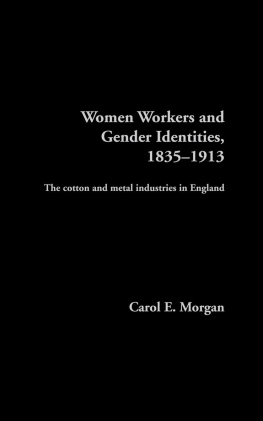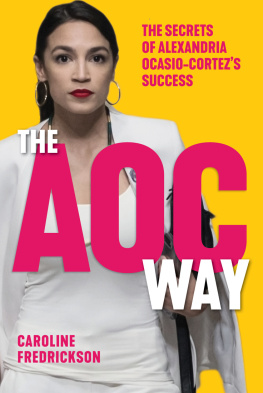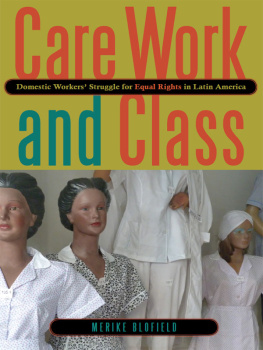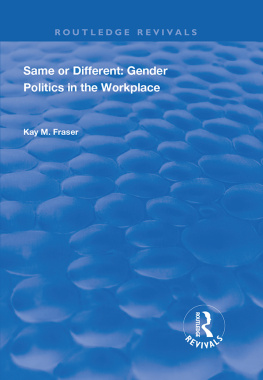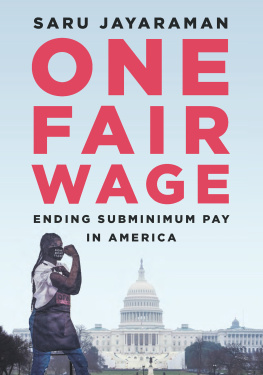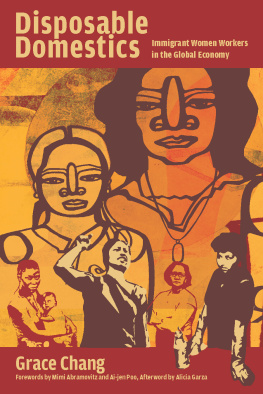UNDER THE BUS

To my beloved mother who taught me to believe in the intrinsic dignity of all people
2015 by Caroline Fredrickson
All rights reserved.
No part of this book may be reproduced, in any form, without written permission from the publisher.
Requests for permission to reproduce selections from this book should be mailed to:
Permissions Department, The New Press, 120 Wall Street, 31st floor, New York, NY 10005.
Published in the United States by The New Press, New York, 2015
Distributed by Perseus Distribution
LIBRARY OF CONGRESS CATALOGING-IN-PUBLICATION DATA
Fredrickson, Caroline.
Under the bus : how working women are being run over / Caroline Fredrickson.
pages cm
Includes bibliographical references and index.
ISBN 978-1-62097-080-5 (e-book) 1. Sex discrimination in employment--United States. 2. Women--United States--Employment. 3. Household employees--United States. 4. Part-time employees--United States. I. Title.
HD6060.5.U5F74 2015
331.40973--dc23
2014041282
The New Press publishes books that promote and enrich public discussion and understanding of the issues vital to our democracy and to a more equitable world. These books are made possible by the enthusiasm of our readers; the support of a committed group of donors, large and small; the collaboration of our many partners in the independent media and the not-for-profit sector; booksellers, who often hand-sell New Press books; librarians; and above all by our authors.
www.thenewpress.com
Composition by Bookbright Media
This book was set in Goudy Oldstyle and Futura
Printed in the United States of America
10 9 8 7 6 5 4 3 2 1
CONTENTS
Thanks first to Diane Wachtell, Jed Bickman, Sarah Fan, and The New Press for being interested in publishing this book and helping me to shape it; it has been a wonderful partnership, and without their support the book would not have come into being.
I am eternally grateful to Peter Edelman, who has been a magnificent mentor and friend, as well as a sounding board for the ideas in this book (and who gave me the occasional hug when I needed encouragement). And of course I would be remiss if I did not thank my colleagues and the board of the American Constitution Society for Law and Policy, which works every day to ensure the law is a force for good in the lives of all people.
I am very much in debt to the many, many people and organizations who offered me suggestions, invaluable insights, and areas for further exploration, including Sheena Wadhawan and Gustavo Torres of Casa de Maryland; Darrah Sipe, Rebekah Christie, Dolly Martinez, and Nala Toussaint of the Retail Action Project; Myrla Maldonado, Marietta Toboso, Eric Rodriguez, and Lisa Thomas of Latino Union; Ai-jen Poo, Patricia Francois, Andrea Cristina Mercado, and Rosana Reyes of the National Domestic Workers Alliance; Andrea Lee and Katie Joaquin of Mujeres Unidas; Sarita Gupta of Jobs with Justice; Kimi Lee of the United Workers Congress; Saru Jayaraman of the Restaurant Opportunities Center; Haeyoung Yoon and Christine Owens of the National Employment Law Project; Terisa Chaw of the National Employment Lawyers Association; Joe Sellers of Cohen Milstein; Lynn Rhinehart of the AFL-CIO; and Judy Scott at SEIU, who provides me with ongoing good counsel as a member of the ACS Board. I know I have not captured all of those who have helped me shape this book and my thinkingplease forgive me.
I must of course thank my darling husband, Sean Dobson, who read the drafts and gave me tough but constructive criticism with a hug and a smile and the occasional shoulder rub.
Mathilda Olafsson was only eighteen when she left Sweden at the end of the nineteenth century. At home in the fishing village of Nogersund, she had helped her widowed father raise her younger siblings, but when they died one by one, she became just an extra mouth to feed and was forced to set out on her own. Sweden was so poor that her only hope for survival was to come to America. She gathered up her few possessions and sailed steerage to Boston, with no family to meet her and no savings to sustain her. Though she was lucky to land a job as a scullery maid on Beacon Hill, her days were full of backbreaking labor; she ate the scraps from her employers plates when they were done with their meals, and she hoarded her small earnings. Immigrant women were subject to sexual harassment, underpayment, abusively long hours, and no hope of overtime, health care, or retirement security. Mathilda was my great-grandmother.
I found Mathildas bravery very inspirational when I was young. I even used it as the basis for my college application essay. It was so cinematicin my minds eye, I could picture her taking her bedroll and a few coins and setting off by herself across the sea, the wind in her hair and her eyes on the horizon. I never thought about the cramped and fetid quarters belowdecks, about the likelihood of her facing physical danger or enduring sexual assault, or about her actual experience once she arrived in Boston. Least of all did I focus on the harsh reality of her life downstairs, scrubbing pots until her fingers bled, eating food scraps, suffering abuseand having no legal rights at all. There was no romance in that story, and it seemed far from todays world.
Well over a century later, Ephese, another domestic worker trying to escape poverty, arrived from Port-au-Prince, Haiti, to find abusive conditions similar to those Mathilda faced. After ten years as a caregiver in New York, Ephese still cries every day before going to work. Her first job was caring for three children part-time in Brooklyn, where she lived. Her employers paid her incredibly poorly, and the $75 she earned for three very long days per week did not come near to covering her bills. Moving to a full-time job as a home health aide, Ephese was not allowed to take any breaks during her shifts, and when she moved back to a child care job, she wasnt allowed any days off at all, even on occasions when she was so sick she needed to see a doctor.
And theres Sonia Soares, who has toiled as a home health aide and housekeeper for more than thirty years, suffering similar abuses. Testifying in front of the Massachusetts legislature, she painted a bleak picture of her conditions of work: My colleagues and I clean up to 14 houses a day and still struggle to make ends meet.... I personally have been slapped in the face, pushed, yelled at and sexually harassed. Other nannies and health aides told legislators stories of eighteen-hour days, employers who subtract money from their wages, who refuse to allow them to see a doctor when sick, who have no legal obligation to pay overtime.
Over the past one hundred years, America has adopted a variety of progressive laws meant to improve wages and working conditions, but these laws have left many behind. During the New Deal, President Franklin D. Roosevelt and his allies, forced to bargain with the Dixiecrats, traded off the rights of certain African American and women workers in order to get votes for bills providing a minimum wage, overtime, and the right to join a union for other workers. Subsequently, legislation barring discrimination in employment, requiring family leave, and providing health insurance, among other features, has excluded many women through different mechanisms but with similar consequences. Not just nannies, home health aides, and housekeepers, but also farmworkers, small business employees, independent contractors, temporary workers, and others have almost no protections under the law. The numbers add up fast.
Next page

